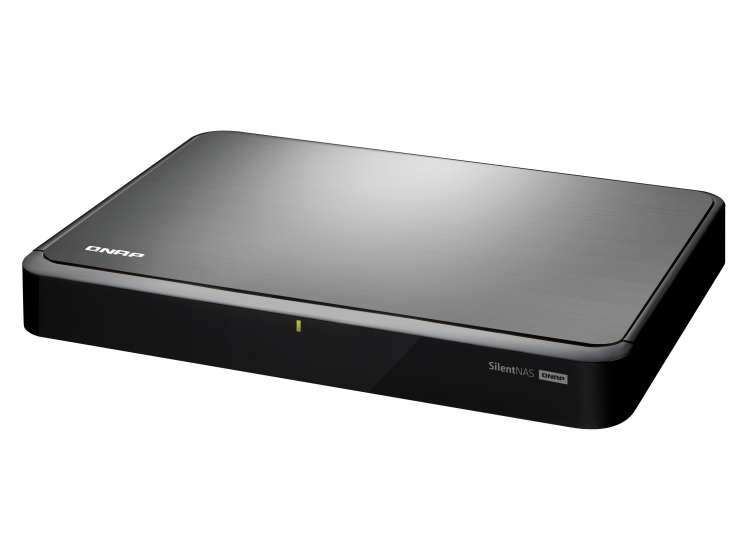QNAP Intros New Silent NAS Series Server
QNAP Systems introduced on Tuesday a new entry in the company's line of Silent NAS series, the HS-251. This unit is designed for the living room, sporting a fanless, 2-bay set-top-box form factor that looks right at home next to the HDTV and cable box.
According to the specs, the HS-251 includes an Intel Celeron dual-core processor clocked at 2.41 GHz (burst up to 2.58 GHz), 1 GB of DDR3L RAM, 512 MB of flash memory, and enough room for two 2.5-inch or 3.5-inch SSD or NAS hard drives. There are also two hot-swappable trays, two Gigabit Ethernet ports, one HDMI output, two USB 3.0 ports and two USB 2.0 ports. QNAP suggests that customers use SSDs or WD Red and Seagate NAS drives.
"With its powerful dual core processor, HDMI connectivity and completely fanless design within a set-top box, the HS-251 is a marvel of engineering," said Jason Hsu, product manager of QNAP. "This amazing product is coupled with an unrivaled set of apps & software features that will allow home users to enjoy a perfect home theater experience, secure & centralize their files & data, and much more."
The device is powered by QNAP's QTS 4.1 operating system, which features a multi-window operation and a familiar user interface. This platform allows users to centralize their files, data and backups, stream movies and other videos to various network players, and access and manage files using a tablet or smartphone. The platform also enables users to sync files across all computers, tablets and mobile devices on the network.
"The HS-251 can flexibly convert videos into formats that can be played smoothly on PCs, mobile devices and smart TVs, as well as allowing multiple devices to simultaneously watch different videos," states the PR. "Users can enjoy high quality videos by selecting a suitable resolution via File Station, Video Station, or the iOS and Android Qfile app even when in remote sites with limited/restricted Internet access."
The HS-251 follows the company's HS-210 NAS device that features the same fanless set-top-box form factor. This $329.99 unit includes a Marvell processor clocked at 1.6 GHz, 512 MB of RAM, 16 MB of flash memory, and only one Gigabit Ethernet port. However, unlike the newer HS-251, this model also provides an SD card slot for adding even more storage.
For more information about the new HS-251 NAS storage device, head here. Although it is available now for purchase, the pricing is currently unknown. Given the HS-210 is currently selling for $330 USD (Amazon shows $269.99), the newer version will likely have a higher price tag.
Get Tom's Hardware's best news and in-depth reviews, straight to your inbox.
Follow Kevin Parrish @exfileme. Follow us @tomshardware, on Facebook and on Google+.

Kevin Parrish has over a decade of experience as a writer, editor, and product tester. His work focused on computer hardware, networking equipment, smartphones, tablets, gaming consoles, and other internet-connected devices. His work has appeared in Tom's Hardware, Tom's Guide, Maximum PC, Digital Trends, Android Authority, How-To Geek, Lifewire, and others.
-
amk-aka-Phantom I can't NOT react negatively to prebuilt NASes anymore. They have weak hardware, they're not flexible, they are overpriced. I built my own NAS that's running Windows 7 (can do Linux but CBA) and not only it's extremely versatile but it also saved me when my main PC was broken, since even an AMD E-450 allows to do most of office and browser tasks when paired with an SSD.Reply
Now, look at the specs of this QNAP NAS... one of our clients has a similar one. Default firmware is limited crap - NAS has two Ethernet ports, can't use them for routing. Installed Debian - works great, but the processor power is pathetic. Want to run a print server? You can't - this chip (probably weaker than what's in my Samsung Galaxy S1) chokes on rendering one A4 page of plain text. Upgrade it with USB 3.0? Nope, of course you can't. And a million other small issues a custom-build NAS would be able to avoid...
Enthusiasts: build your own. Businesses: get your IT department to. They'll have fun, you'll have a more flexible device that will run into less issues. Hell, it might even end up being cheaper! I see that the hardware of this particular model is much better, but I still won't trust something as limited compared to a customized Mini-ITX build. As one of my colleagues said, "the only advantage this thing has is nice hot-swap bays". And how often do you *really* swap drives in your NAS? :)
